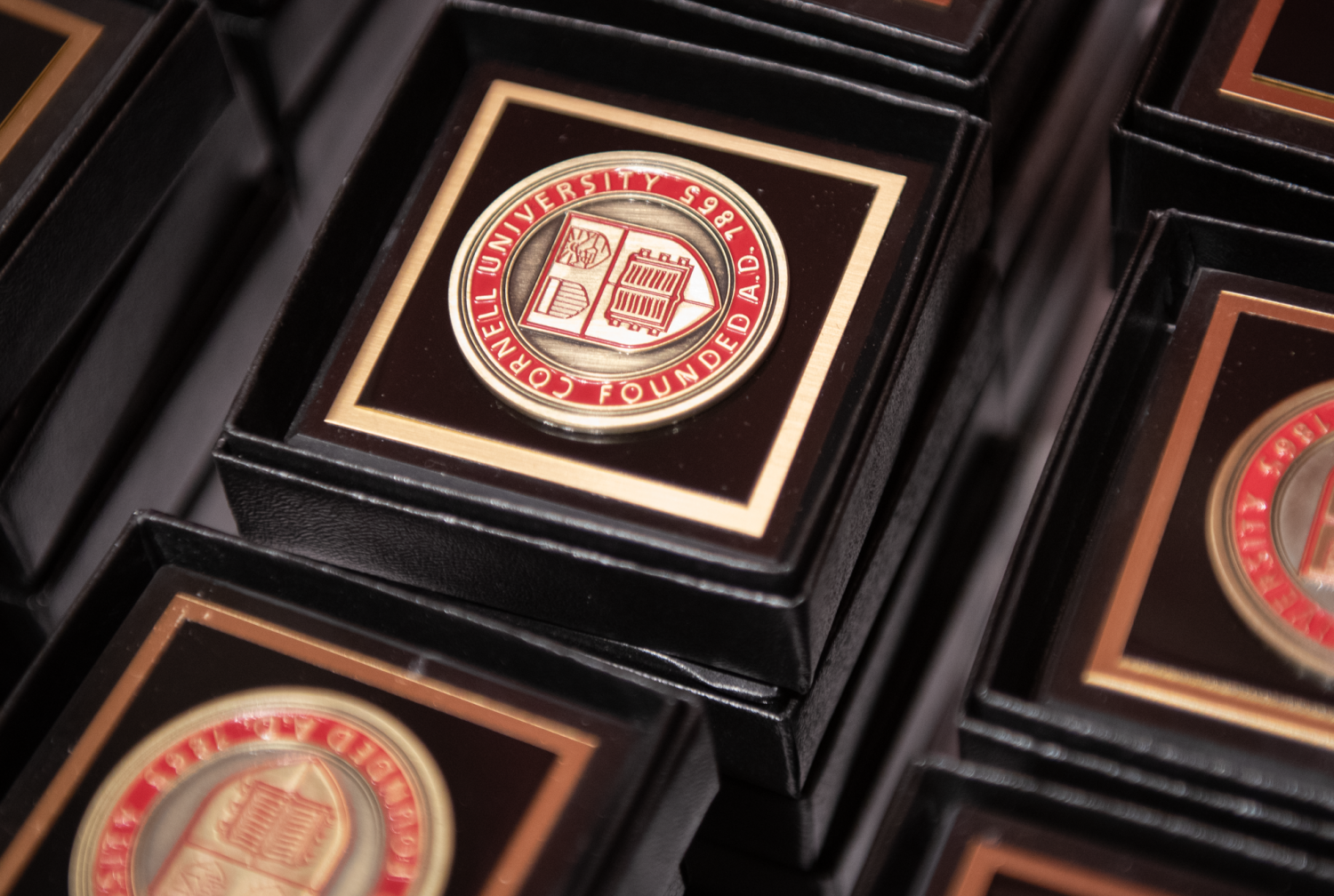
2003 joint Commencement ceremonies for Weill Medical College and Graduate School of Medical Sciences of Cornell University.
On May 28, joint Commencement ceremonies for Weill Medical College and Graduate School of Medical Sciences of Cornell University were held in Lincoln Center's Avery Fisher Hall.
The Medical College conferred 98 M.D. degrees, and the Graduate School of Medical Sciences conferred 23 Ph.D. degrees and 6 M.S. degrees. Of the new Medical College graduates, 15 were members of the Tri-Institutional MD-PhD Program administered jointly by Weill Cornell, The Rockefeller University, and Memorial Sloan-Kettering Cancer Center.
President Rawlings' Remarks
Hunter Rawlings, who has served as president of Cornell University since 1995, gave his last Commencement address as president. (On March 15, 2002, Rawlings announced his intention to retire as president on June 30, 2003. He will be succeeded by Jeffrey Lehman, dean of the University of Michigan Law School.)
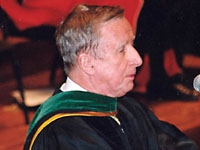
Hunter Rawlings, president of Cornell University
In his remarks to the graduates, President Rawlings reflected on the strengths of Weill Cornell, including its advancing medical curriculum, contributions to patient care, and commitment to international studies.
"Weill Cornell is stronger today—by many significant measures—than it was even a decade ago. When I first came to Cornell, in July 1995, the Cornell Medical College (as it was then known), had a proud history and a strong pedagogical program, but it lacked good educational space and research facilities. Today it is a pacesetter and an international leader in medical education and biomedical research as well as in patient care. And, although we really don't put much stock in rankings, I note that Weill Cornell now ranks among the top U.S. medical schools, with significant improvement in several areas—from NIH research funding to MCAT scores."
Rawlings noted that Weill Cornell's increasing distinction and impact have been due to "the strong leadership of Dean Gotto; a forward-looking medical curriculum with a highly computerized, problem-based team approach; expanded research capabilities through (additional) faculty appointments and improved facilities; a new level of partnership with our sister institutions on the Upper East Side and with Cornell (Ithaca); and the vision and benefaction of many alumni, and, most significantly, Joan and Sanford I. Weill, whose generosity and leadership have transformed Weill Cornell in all three facets of its mission: teaching, research and patient care."
Reflecting on his years as president, Rawlings said, "What impresses me most is the willingness of Weill Cornell to maintain its international focus and commitment to improving human health in an increasingly dangerous world. Your eagerness to work abroad is doubly courageous in the era of SARS, which two weeks ago prompted some 160 doctors and nurses in Taiwan to resign en masse because they feared catching the disease in the hospitals where they work."
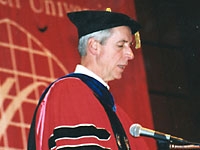
Dr. Antonio Gotto, dean of the Medical College
Rawlings hypothesized, "Given the expense of anti-viral drugs, how do we deal with the disparity in care available in the developed and developing worlds to those afflicted with diseases like HIV/AIDS? How do we resolve these dilemmas? Or rather, how will you resolve these dilemmas, when you enter your careers as physicians and biomedical researchers? It appears very likely that you will confront these challenges for many years to come, and that the answers you give will define the medicine you offer and the world you leave your children.
"Although Weill Cornell cannot give you specific answers to those questions, it has given you the intellectual toughness and the practical skills you will need to address them. Through the example of the professors with whom you have studied and carried out your research, through your course work, and through the many service activities you have pursued internationally and right here in New York, Weill Cornell has helped you become superbly trained, intellectually receptive, and humanely grounded physicians and biomedical researchers. And as we recognize your achievements by the granting of degrees, it is my pleasure to congratulate you on your accomplishments and to wish you well in confronting the dilemmas of health and disease in an increasingly global and dangerous environment," Rawlings concluded.
Student Speakers
James Tauras from the Medical College and Andrea Basso from the Graduate School of Medical Sciences represented their classes as the student speakers.

Dr. David Hajjar, dean of the Graduate School of Medical Sciences
Dr. Tauras reflected on the lessons learned while in medical school and the important role faculty members played in his education. "The aspect of the profession that has most impressed and inspired me, more than the work ethic, more than the daily expectation of excellence, is the continual, daily emphasis on education. In our profession, there is an understanding that everyone, from the most senior attending down to the third-year student, must learn something new every day. Teaching what you know is also an unconditional requirement. In this light, it is vital that a medical college be endowed with a brilliant and dedicated faculty.
"Despite the dour assessments of life for academic physicians—with more and more time now dedicated to grant writing, and with increased clinical responsibilities and ostensibly less time for teaching—a dedicated core of our faculty still finds the time to teach and mentor medical students. They make this commitment for several reasons, as I see it... they love teaching... they recognize how vital excellent teaching is to the future of our profession. And finally, as the old adage says, like all great teachers, members of our faculty are truly students at heart."
Dr. Basso talked about Weill Cornell in relation to its surrounding institutions. "The institutions fit together to form a corner of Manhattan rich in scientific endeavors, world-renown for scientific breakthroughs, which have had and will continue to have a significant impact on biology and medicine. It is this environment that has allowed us as students to flourish. Cornell is a vital part of the puzzle and is a linking force between these institutions.
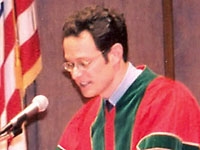
James Tauras, student speaker for the Medical College
"As graduate students, we were given the opportunity to work with people in various departments, the chance to collaborate with other universities, and some of us, such as myself, had the privilege to study at the Cornell Biodiversity Laboratory in the Dominican Republic. Additionally, we were given the means to present our data at scientific meetings. All of this exposed us to a broad array of scientific knowledge. The education, laboratory training, seminars and outside collaborations prepared us for our future endeavors.
"The graduate school experience itself can be thought of as assembling a vast jigsaw puzzle. The completion of this puzzle is symbolized in the thesis, with each experiment representing a piece of the puzzle. Rarely do the pieces fit into place on our first attempt. From this we learned to overcome disappointments and the importance of repeating experiments. Despite many hurdles, we were motivated and determined to complete the impressive mission of putting together the scientific jigsaw puzzle. As the last piece is laid in place the image becomes clear: it is the vision of discovery and science at its very best. And for that we should be very proud of, for we have accomplished the ambitious task of deciphering our own scientific question."
Alumni Awards of Distinction
Commencement ceremonies also included presentations of the Medical College's and Graduate School's Alumni Awards of Distinction to Dr. Elizabeth Barrett-Connor, who received her M.D. in 1960, and Dr. Abel Robertson Jr., who received his Ph.D. in 1959.
Doctors of Medicine: Weill Medical College
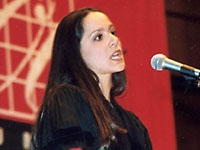
Andrea Basso, student speaker for the Graduate School of Medical Sciences
Angel Alejandro
Taslim Allibhai
Joseph Arron
Sarah Arron
Helen Azzam
Steven Balt
Nathaniel Berman
Jason Billinghurst
Bryan Burt
Ping Chi
George Comas
Michelle Denburg
Rahul Deo
Christian DiPaola
Matthew DiPaola
Richard Do
Vassily Eliopoulos
Grace Fan
Jason Fish
Lowell Frank
Matthew Fred
Johanna Freedman
David Gidseg
Jonathan Glass
Laleh Golkar
Christian Gómez-Castro
Isabel Green
David Greenblatt
Alexander Greenstein
Catherine Grossman
Kirana Gudi
Omar Gutierrez
Susan Herzlinger
Bradford Hoppe
Rafaz Hoque
Michael Huang
Catherine Johnson
Jason Kahn
Joanna Kalb
Laurie Kane
David Kaufman
Julie Kaufmann
Manmeen Kaur
Rebecca Keith
Eleanore Kim
Valencia King
Kelly Krueger
Saaron Laighold
Nancy Lange
David Lee
Jimmy Lee
Sena Lee
Jonathan Lee-Melk
Alexis Leibel
Zanie Leroy
Sarah Levin
Jeffrey Liu
Alfredo Maldonado
Ethan Marin
Chad Marsden
Jamie Masone
Anjuli Mehrotra
Kurt Melstrom Jr.
Dorinna Mendoza
Maria Menezes
Tina Meyer
Elisa Muniz
Julie Myers
Russell Nord
Mallay Occhiogrosso
Kristina Paley

Graduating students at 2003 Commencement
Jessica Peña
Stephanie Perlman
Michael Peterkin
Alexandros Polydorides
Beth Preminger
Michelle Roach
Amy Schefler
David Shih
Tien-An Shih
Lindsay Smithen
Agata Smogorzewska
Alexander Soukas
Joshua Stern
Eric Strauss
James Tauras
Richard Thoms
April Tignor
Jeffrey Tsai
Maureen Tyson
Danique VanDongen
Anna Vergun
Erez Vidan
Christina Wainwright
Rebecca Wolf
Benjamin Wong
Annie Wu
Alice Zervoudakis
Doctors of Philosophy: Weill Graduate School of Medical Sciences
Joseph Amprey III
Andrea Basso
Darya Burakov
Gina Capiaux
Xu Chen
Rachel Darken
Debbie Friedman
Christopher Bailey
Simon Bernèche
Pearl Chang
Yunbo Chen
Hyunsil Han
Wei Huang
Kehkooi Kee
Edmund Kim
Yoon-Seong Kim
Yiran Lu
Ramee Lee
Pellegrino Magro
Kha Nguyen
Teresa Ramirez-Montagut
Sharon Strope
Haijuan Yang
Masters of Science: Weill Graduate School of Medical Sciences
Barbara Franklin (Gorfajn)
Anita Hsieh
Jocelyn Garrick
Sung Lee
Lakshmi Moorthy
Erica Phillips
Photos by Richard Lobell and Amelia Panico.

